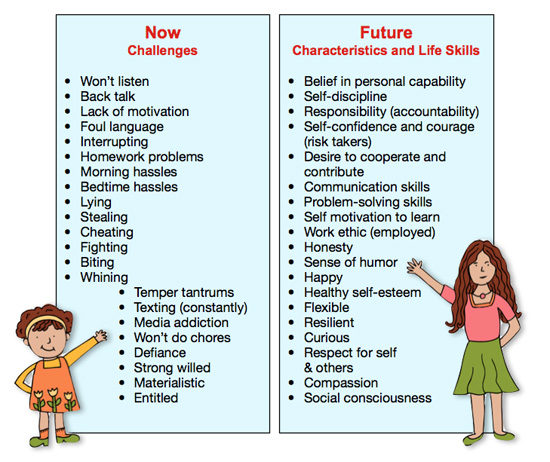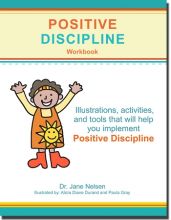Click Here to Download a PDF Version of this activity.
When embarking upon the journey into Positive Discipline, it helps to have a destination in mind, and a road map to help you get there. Creating a list of characteristics and life skills you hope to have your children develop can serve as your road map.
Imagine your child is now 25-years-old and has knocked on your door for a surprise visit. What kind of person do you hope to see in front of you? What characteristics and life skills do you hope he or she has?
Many parents don’t realize that the discipline methods they use do not help them accomplish what they really want for their children. The first step in learning to be the best (but not perfect) parent you can be is to create a roadmap to guide you to your destination. This activity will help you be clear about what you want for your children.
Following is a list of behavior challenges (Now) and life skills and characteristics (Future) brainstormed by parents in many classes. They are always very similar. How many of these challenges and goals were on your list? Are there some you would like to add to your list?
Copy and hang your list of Characteristics and Life Skills where you will see it daily to keep your destination in mind.
During our Positive Discipline workshops and classes, we teach through experiential activities in which parents have the opportunity to role-play parents and children. This provides them with the opportunity to get into the child’s world to gain a sense of what works and what doesn’t work.
After each activity, the adult who role-played as the child is taken to two lists (similar to those above) that are prominently displayed on a wall, and asked, “As the child, were you learning anything on this list of characteristics and life skills?”
After experiencing an ineffective parenting method, the “child” always says, “No.”
We then point out the list of challenges and ask if he or she is feeling motivated to engage in any of these behaviors. The “child” usually points out several misbehaviors that he or she feels motivated to do. This helps parents understand how they may have a part in creating the misbehaviors they complain about. They experience what it is like to be a child who responds to disrespectful parenting methods with more misbehavior, and why the child acts that way.
After the “child” experiences a Positive Discipline tool during a role-play, he or she is always able to identify several of the characteristics and life skills he or she is learning. This kind of experiential learning has a greater impact on parents than any other kind of learning.
Will all of these activities and tools turn you into a perfect parent? No. Sorry, there is no such thing as a perfect parent.
Will your children feel a sense of belonging, significance, and a strong belief in their personal capability? Yes.
Does this mean they will be perfect and never misbehave? No! It is part of their developmental process to individuate—to test the boundaries as they discover who they are and how to use their personal power. All the more reason to use parenting tools that focus on problem-solving skills instead of methods that increase power struggles and revenge cycles.
This workbook will help you understand that behavior challenges create wonderful opportunities to teach your children the valuable social and life skills you want for them.
You will learn:
- Why punishments and rewards don’t work (based on brain research and your personal experience).
- Many parenting tools that are empowering and encouraging to you and to your children.
- How to get into your child’s world to understand what works and what doesn’t work—long term.
- How to be encouraging to your children AND to YOURSELF when you make mistakes.
- Many tools you can use right away to increase your joy in parenting.
- MUCH MORE!



